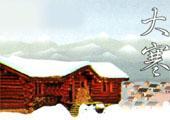Dahan
Dahan (大寒) is one of 24 traditional Chinese solar terms, reflecting the changing of four seasons. It falls between Jan. 20-22 and most parts of China have entered the depth of winter.
Weather:
Although in most cases, the period of Dahan is warmer than that of Xiaohan, the lowest temperature in a year may appear in Dahan period. The precipitation in Xiaohan and Dahan is the lowest in a year, with 5-10mm in south China and 1-5mm on northwest plateaus.
Festival:
Spring Festival, the most important traditional festival, falls in the Dahan period. On the 8th day of the 12th month in lunar calendar, every family in north China would cook "Laba" porridge, which is composed of eight ingredients like rice, corn, peanuts, chestnuts, red jujubes, walnuts, lotus seeds and preserved fruits. This tradition came from the Eastern Han Dynasty (25-220) when Buddhism was introduced into China. Monks gave relief porridge to the poor on the 8th day of the 12th month. Even now, the Laba porridge is still a main dish on the table during the Spring Festival. The 23rd day of the 12th month is traditionally "small New Year", from when, a series of activities for the celebration of the New Year begin through Spring Festival until the Lantern Festival on the 15th day of the 1st month of the New Year.
